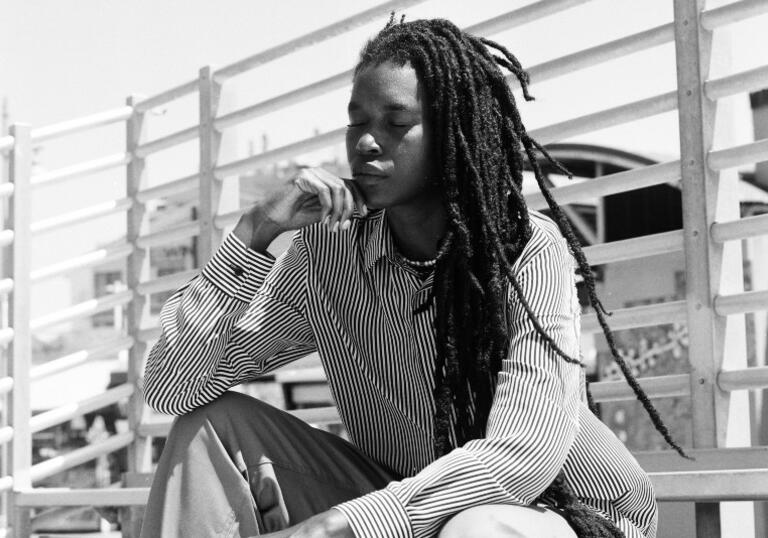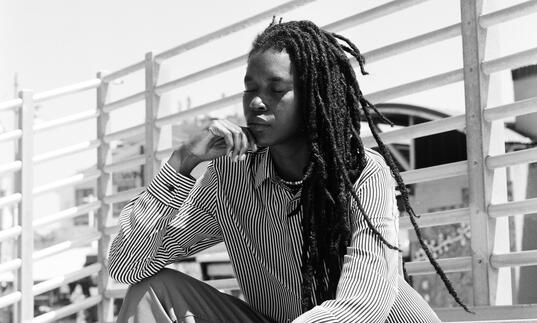Moor Mother: Jazz Codes - digital programme

Oumar Saleh talks to Moor Mother about the myriad of influences behind her latest album Jazz Codes ahead of her Hall performance.
It’s quite the task trying to pin down exactly what Moor Mother’s oeuvre is. Renowned for transcending conventional genre borders since her searing 2016 debut LP Fetish Bones, the Philadelphia-based poet, musician, activist, visual artist, community educator, and Afrofuturist born Camae Ayewa considers herself amongst the avant-garde but isn’t keen on boxing herself inside a single creative medium. ‘I feel like it’s almost a disservice to attach myself to any one genre,’ she explains. ‘People tend to gravitate towards what they like, but I feel like my work is too expansive to have boxes be put in.’
Much like Fetish Bones, 2019’s Analog Fluids of Sonic Black Holes, and her multi-layered albums with veteran underground rapper billy woods (2020’s Brass) and noise experimentalist DJ Haram as 700 Bliss (2022’s Nothing to Declare), there’s an undercurrent of raw tension and righteous anger scattered throughout Jazz Codes. However, Ayewa’s latest — an intimate sequel-of-sorts to last year’s Black Encyclopedia of the Air — is enveloped in a newfound loveliness that also doffs its cap to the blues, soul, rap, ‘80s quiet storm, ‘90s R&B, and the pivotal role that jazz played throughout Black America and its cultural history.
‘I love all the heroes of African jazz, and dance, and soul music, but my first experience with jazz came about when I bought my first Miles Davis record Tutu,’ Ayewa reminisces. ‘Tutu was cool, but it wasn’t exactly what I was looking for. I was then recommended On the Corner, and once I listened to that, it was over as far as me being just a listener, and more about wanting to get to know these artists’ stories.’
Ayewa’s quest to decipher Jazz Codes began with a collection of poems honouring her musical heroes. Upon realising that her words were begging to be transformed into music, she reached out to frequent collaborator and producer Olof Melander for some jazz loops. Pianist Jason Moran, flutist Nicole Mitchell, and members of Ayewa’s free jazz quintet Irreversible Entanglements hop along for the ride, along with a variety of guest vocalists and rappers including Melanie Charles, Wolf Weston, Alya Al-Sultani, Elaine Mitchener, AKAI SOLO, and Fatboi Sharif. Like her previous works, Jazz Codes is grounded in the tenets of Black Quantum Futurism — an artistic collective she founded with fellow Philly-based activist Rasheedah Phillips, with the goal of mapping out and manifesting a better life for marginalised communities using futurism and an understanding of the past as a vehicle.
Jazz Codes is also Moor Mother at her most hopeful and celebratory. She weaves together a rich tapestry honouring various icons, with tender shoutouts to Amina Claudine Meyers on ‘So Sweet Amina’, Mary Lou Williams on the serene ‘Ode to Mary’ (which closes with a recording of Williams eulogising Dizzy Gillespie), Abbey Lincoln and Betty Carter on the soulful ‘Golden Lady’, and Billie Holiday’s resilience on ‘April 7th’ (the date being the legendary singer’s birthday). She even channels OutKast’s Andre 3000 on the AKAI SOLO-assisted ‘Rap Jasm’, a smooth head-nodder that evokes the warmth of J Dilla’s drum-centric beats — something that Ayewa herself enthusiastically acknowledges.
‘I was in a punk band called The Mighty Paradocs before Moor Mother, and when I decided to go solo, all I wanted to do was to create tracks like Dilla,’ she says. ‘Moor Mother’s kinda been my way of expressing the tradition of what Dilla was doing on Donuts: growing up in a musical household, his mother encouraging him, it’s the same thing with my family, where my parents’ musical tastes influenced me greatly.’
Jazz Codes ends with a passage from scholar and critic Thomas Stanley, who decries the word ‘jazz’ as a peculiar one with illegitimate origins. Making the album hasn’t changed Ayewa’s perception on what jazz truly is, though. ‘It’s African-American classical music,’ she says. ‘People come with so many words to describe it, but that takes away the artistic value of what we’re doing as free jazz musicians.’ Lamenting how today’s artists have to commodify themselves to remain relevant on streaming platforms, Ayewa’s philosophy is more in line with the jazz musicians of yesteryear, who rejected labels and instead focused on the advancement of creative music.
When asked about Moor Mother’s next album, Ayewa doesn’t divulge too many details. Nonetheless, she confirms that the follow-up to Jazz Codes will be ‘all about Britain’. ‘I can’t say too much, but it’ll be more of a Moor Mother record that combines the elements of jazz with a more industrial, experimental sound,’ she says. ‘There’s no hip-hop on it, but that’s all I’ll say for now!’
Even through the phone, Ayewa’s excitement at playing at the Barbican is palpable. Her last appearance here was in 2019 alongside the London Contemporary Orchestra, performing an orchestral exploration of colonialism and the Commonwealth called The Great Bailout. Tonight’s gig promises to mix Jazz Codes’ myriad influences, especially the blues. ‘I hope that people see that Jazz Codes is also about the blues, for it and jazz go together hand-in-hand,’ she says. ‘The Barbican has supported me so many times throughout my journey as a professional musician. I just hope to return and keep evolving, and it’s nice to perform in a space where you’re allowed the ability to be your whole self.’
Details
Performers
Moor Mother vocals
Alya Al-Sultani vocals
Dudu Kouate percussion
Farida Amadou bass
Pat Thomas piano
Elaine Mitchener vocals
Edward Wakili-Hick percussion
Aquiles Navarro trumpet

